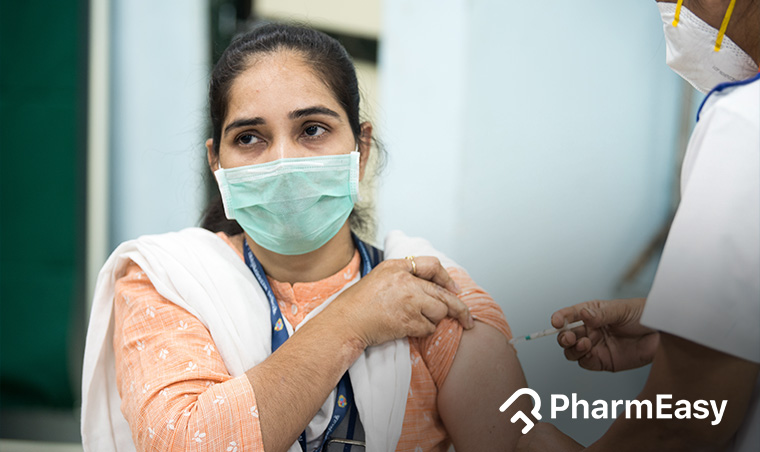COVID Vaccine Booster Shots: Do You Need One?
By Shantanu Sodhi +2 more

Get more insightful and
helpful tips to
treat Diabetes for FREE



Download PharmEasy App




Register to Avail the Offer
Send OTPBy continuing, you agree with our Privacy Policy and Terms and Conditions
By Shantanu Sodhi +2 more
This year, India and the world have been going full throttle to vaccinate people and immunize the population against COVID-19. Two shots of all the approved COVID-19 vaccines are highly effective, safe and teach your immunity to protect you from the coronavirus.

However, recent research has thrown light on an uncomfortable fact. There are thoughts that COVID vaccine efficacy starts to dwindle a few months after the second shot is administered. For example, Pfizer efficacy drops to 77% after 4 months and Moderna efficacy remains 92% for about 5 months after which it may start declining. Antibody levels drop and does this mean, your immunity against COVID-19, especially more dangerous variants like Delta declines?
In this context, the medical community is discussing the importance of the COVID-19 booster shot. This is where the ‘3rd dose’ of the COVID vaccine comes into play.
Table of Contents
Booster shots are the same vaccines that are being administered to fight COVID-19. Since antibody levels become quite low about 6 months after complete vaccination, booster shots can amp up the waning immune system. Research has also revealed that when people are given mRNA booster shots, then their immunity can increase up to 10 times! You will need lots of antibodies to shield you from Delta or any other highly contagious COVID variant.
This depends on how long the vaccine maintains its efficacy in your body. Some vaccines continue being highly effective up to 6 months after the 2nd dose whereas some start losing their effectiveness after about 4 months. As soon as the antibody count starts to drop, it will be time to get booster shots.
Eventually, everyone will possibly need booster shots to give a boost to their flagging immunity against COVID-19. But, as with the rollout of the vaccination programme, there will be priority groups who will be first in line to the booster shots:
Many countries have announced booster shots for selected populations. As of now, there is no such declaration about the third dose of the COVID-19 vaccine in our country. It is fair and essential to focus on the completion of the two-course vaccination drive going at present and then plan and prepare for the third dose if established vital by studies.
Until the Union government and the state governments come to a decision about the execution of the 3rd dose of COVID-19 vaccines, you can’t really avail of the booster shots. In the intervening time, make sure you get both the first and second shots of the vaccine and follow COVID-appropriate behaviour to keep yourself and the community safe.
Also Read: Omicron Variant & Vaccine Efficacy
There are limited studies and data on the long-term efficacy of vaccines. Some experts also opine that one should not worry about the decline in the number of antibodies after both doses of the vaccine because your immunity keeps a memory of the response needed and is capable of producing more antibodies when required. However, we need more studies and data to confirm this scenario. Till the time all you can do is to get both shots of vaccine and stay calm but not careless. The threat of COVID-19 has not gone away. Even if you are fully vaccinated, remember, there is still a possibility that you may contract COVID-19 unless you are careful. So, continue wearing masks, avoid crowded places, sanitize your hands and wash up thoroughly after coming home.
Also Read: Omicron Variant: Risk & Precautions
Disclaimer: The information provided here is for educational/awareness purposes only and is not intended to be a substitute for medical treatment by a healthcare professional and should not be relied upon to diagnose or treat any medical condition. The reader should consult a registered medical practitioner to determine the appropriateness of the information and before consuming any medication. PharmEasy does not provide any guarantee or warranty (express or implied) regarding the accuracy, adequacy, completeness, legality, reliability or usefulness of the information; and disclaims any liability arising thereof.
Links and product recommendations in the information provided here are advertisements of third-party products available on the website. PharmEasy does not make any representation on the accuracy or suitability of such products/services. Advertisements do not influence the editorial decisions or content. The information in this blog is subject to change without notice. The authors and administrators reserve the right to modify, add, or remove content without notification. It is your responsibility to review this disclaimer regularly for any changes.

Leave your comment...
Comments